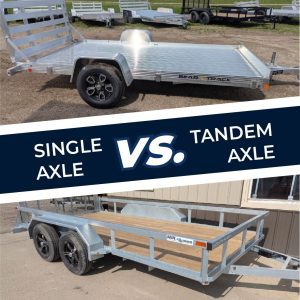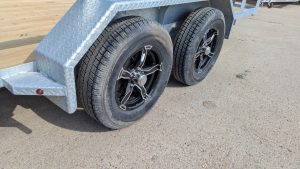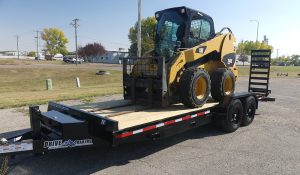Single Axle vs. Tandem Axle Trailers: Which One Should You Choose?
 If you’re in the market for a trailer, one of the first decisions you’ll face is whether to go with a single axle or tandem axle model. It might seem like a small detail at first, but that choice can make a big difference depending on how you plan to use your trailer, what you’ll be hauling, and how often you’ll be towing. Whether you’re based near Starbuck, heading out of Alexandria with weekend gear, loading equipment in Morris, or trailering toys around Glenwood, it’s a decision worth taking a closer look at.
If you’re in the market for a trailer, one of the first decisions you’ll face is whether to go with a single axle or tandem axle model. It might seem like a small detail at first, but that choice can make a big difference depending on how you plan to use your trailer, what you’ll be hauling, and how often you’ll be towing. Whether you’re based near Starbuck, heading out of Alexandria with weekend gear, loading equipment in Morris, or trailering toys around Glenwood, it’s a decision worth taking a closer look at.
Let’s break down the key differences, pros and cons, and what might make the most sense for your specific hauling situation.
What Is a Single Axle Trailer?
A single axle trailer has just one axle with a set of wheels attached, usually mounted near the center of the trailer’s bed. These trailers are typically smaller, lighter, and easier to maneuver than their tandem axle counterparts.
Benefits of a Single Axle Trailer:
Easier to Tow and Park: With a shorter body and less weight overall, single axle trailers are generally simpler to move around. This comes in handy in tighter areas like small farmyards, compact driveways, or local storage lots around towns like Starbuck or Morris.
Lower Upfront Cost: Fewer parts mean a more affordable price tag. For many, this can be a great entry-level option when starting out or when transporting lighter loads.
Reduced Maintenance: One axle means fewer tires, brakes, and suspension parts to worry about down the road.
Ideal Uses:
• Hauling lawn mowers, small ATVs, or garden tools
• Light construction equipment
• Shorter hauls and occasional use
However, it’s important to consider the trailer’s weight rating. Single axle trailers typically have a lower weight capacity. If you’re planning to haul heavier items, you might quickly reach that limit.
What Is a Tandem Axle Trailer? 
A tandem axle trailer features two axles, usually placed close together under the trailer body. This setup provides better stability and can handle more weight overall.
Benefits of a Tandem Axle Trailer:
Higher Load Capacity: Tandem axles distribute weight more evenly across four tires instead of two, which means you can carry heavier equipment or larger loads with ease.
Increased Stability: These trailers tend to track better at highway speeds and offer more stability over rough terrain or gravel roads—common throughout rural parts of Minnesota.
Durability: Tandem axle trailers are often more robust, with stronger frames and enhanced braking capabilities.
Ideal Uses:
• Transporting large machinery or multiple ATVs
• Hauling firewood, gravel, or livestock
• Longer hauls with frequent highway travel
• Commercial or agricultural use
If your plans include frequent use or you often tow on roads across Minnesota—or beyond—it might be worth looking at the tandem option for the long-term peace of mind.
Things to Consider Before Choosing
While both types of trailers come with their strengths, the right one for you depends on how—and how often—you plan to use it. Here are some key points to weigh when comparing options:
1. What Are You Hauling?
Think about your most common cargo. Will you be hauling a single UTV to the lake, or are you planning to move large pallets of material? A single axle can handle the lighter stuff, but for bigger gear, tandem axles offer the support and durability you’ll want.
2. How Far Are You Traveling?

For short trips across town or quick runs between nearby farms, a single axle trailer is often more than sufficient. But for frequent towing at highway speeds—especially with hills and curves—tandem axles provide extra safety, better handling, and improved tire wear distribution.
3. Where Will You Store It?
Not everyone has space to keep a 20-foot trailer in the driveway. Single axle trailers are more compact and easier to store, making them a better option for those with limited room in residential areas.
4. What’s Your Towing Vehicle?
Lighter trailers are easier on your tow vehicle. If you’re using a mid-size SUV or light-duty truck, a single axle model might be a more compatible match. Tandem axle trailers, on the other hand, usually require a heavier-duty vehicle, especially when fully loaded.
Myths and Misconceptions
“More Axles Always Means Better”
Not necessarily. If you’re hauling loads well under the capacity of a single axle trailer, spending more on a tandem model may not bring any added benefit. It might even add fuel costs and complicate maintenance.
“I’ll Just Get the Bigger Trailer ‘Just in Case’”
While planning for the future is smart, bigger isn’t always better if you’re not using that extra capacity. Larger trailers are harder to maneuver and may require additional equipment like trailer brakes or weight distribution systems.
“You Can’t Haul Anything Big With a Single Axle”
False! There are high-quality single axle trailers built for durability and strength. If you’re moving tools, landscaping gear, or even a smaller motorcycle, you might not need anything more.
Let’s Talk Real World Scenarios
Case #1: Hauling Lawn Equipment
 You’ve got a landscaping business and routinely move mowers, weed trimmers, and garden tools across a few nearby properties. A well-built single axle utility trailer offers just the right mix of maneuverability, capacity, and price.
You’ve got a landscaping business and routinely move mowers, weed trimmers, and garden tools across a few nearby properties. A well-built single axle utility trailer offers just the right mix of maneuverability, capacity, and price.
Case #2: Farm Use
You’re hauling hay bales, fencing materials, and the occasional small tractor. You’re also traveling several miles of county roads to get between pastures. A tandem axle trailer would offer better performance and peace of mind on those longer hauls.
Case #3: Weekend Adventures
You and your family enjoy taking the ATVs to the cabin or spending weekends camping. If you’re hauling multiple machines or extra gear, tandem axles help with balance and reduce trailer sway. But if it’s just one ATV, a single axle might do just fine.
What You’ll Find at Glacial Lakes Recreation
At Glacial Lakes Recreation, we carry both single and tandem axle trailers from quality manufacturers we trust like Bear Track, Drive and Cross Trailers. We understand that every hauling job is different—and that’s why we take the time to help you find the right trailer, not just the biggest or most expensive one on the lot.
Our team works with folks all across Minnesota—from weekend campers to working farmers and small business owners. Whether you’re rolling out of Starbuck, crossing through Alexandria, or heading up Hwy 28 from Morris, we’re just a short drive away and ready to talk trailers.
Final Thoughts: Single or Tandem?
There’s no one-size-fits-all answer to whether a single axle or tandem axle trailer is “best.” It all depends on how much you’re hauling, where you’re going, and how often you’re on the road.
The good news? You don’t have to figure it out alone.
Stop by Glacial Lakes Recreation or give us a call at 320-424-1231. We’ll walk through your hauling plans and help match you with a trailer that fits your gear, your vehicle, and your lifestyle—whether that means a rugged tandem axle setup or a compact, easy-to-move single axle trailer.
Glacial Lakes Recreation knows trailers. More importantly, we know Minnesota roads, terrain, and hauling demands. Let’s find the right trailer for your next load—together.
